Recent Developments in IP Case Law on Generative AI
28 December 2023
The rise of generative AI technology has sparked a burgeoning debate in legal and technological spheres focusing on the attribution of intellectual property rights – inventorship of patents, authorship of copyrightable works – to AI systems. While lawmakers are moving slowly, the judicial systems are already handling this challenge.
Patents
UK
Amidst this ongoing discourse, on December 20, 2023, the UK Supreme Court ruled that under the UK Patents Act 1977 (the “Act”), an artificial intelligence (AI) machine cannot be recognized as an inventor.
The Supreme Court unanimously dismissed an appeal brought by Dr. Stephen Thaler, the owner of an AI-powered machine known as DABUS¹, who claimed that DABUS was the “true” inventor of certain inventions covered by two patent applications he had filed in the UK. The UK Supreme Court upheld the UK Intellectual Property Office’s decision that only a natural person can be an inventor under the Act, emphasizing that a machine such as DABUS lacks the legal personality required for such recognition. The Supreme Court further noted that the term “inventor” does not encompass a machine, as such an interpretation would require amending the Act.
While the Supreme Court clearly denies inventorship to non-humans, it does not block the patenting of inventions made with the help of AI, as the Supreme Court notes: “It follows but is important to reiterate nonetheless that, in this jurisdiction, it is not and has never been Dr Thaler’s case that he was the inventor and used DABUS as a highly sophisticated tool. Had he done so, the outcome of these proceedings might well have been different”.
Copyrights
US
The same Dr. Thaler has also attempted to challenge the US Copyright Office’s (the “USCO”) decision of February 14, 2022, which denied his application to register copyright in a work called “A Recent Entrance to Paradise” authored by DABUS.
On August 18, 2023, Dr. Thaler’s appeal was denied by the US District Court for the District of Columbia. The Court interpreted the statutory phrase “works of authorship” to require human creation of the work; as such, artwork generated by AI alone is not entitled to protection under the Copyright Act. Since then, the USCO has rejected two additional applications for copyright registration of AI-generated works. Most recently, on December 11, 2023, the USCO rejected an application for registration of an AI-generated image titled “SUYAST” created by Ankit Sahni using a custom-built AI system called RAGHAV.
According to Mr. Sahni, the creation of “SUYAST” entailed the use of his original photograph of a sunset as a base image, along with an image of Vincent van Gogh’s “The Starry Night” for the “style” to be copied by the AI.
The USCO’s rationale for the rejection was that Mr. Sahni did not contribute any expressive elements to the work but rather only used prompts and selected the style. In this respect, the USCO noted that such choices constitute unprotectable ideas and do not demonstrate sufficient “creative control” by Mr. Sahni over RAGHAV’s creation of the work.
The practical implication of these cases is that although the initial image used as the basis for a prompt (or a written prompt) may be copyrightable if it satisfies all statutory requirements, any output that has undergone AI manipulation is unlikely to qualify for copyright protection under the current “creative control” standard. It remains unclear what degree of human creative control is required in order to qualify for copyright protection.
Copyrights
China
Meanwhile, in China, a recent decision may indicate the emergence of a new trajectory regarding the copyrightability of AI-generated works. On November 27, 2023, the Beijing Internet Court ruled in Li Yunkai v. Liu Yuanchun that an AI-generated image is a work of authorship².
Mr. Li generated an AI-generated image called “Spring Breeze Brings Tenderness” via Stable Diffusion, which image the defendant, Ms. Liu, later copied to her social media post. Mr. Li filed a lawsuit claiming that Ms. Liu had infringed his copyright in the AI-generated work.
The Beijing Internet Court considered the following criteria to determine whether “Spring Breeze Brings Tenderness” constitutes a copyrightable work: (1) whether it falls within the fields of literature, art and science; (2) its originality; (3) whether it has a specific form of expression; and (4) whether it is a creation of human intellect.
With respect to the third and fourth criteria, the Beijing Internet Court ruled that the plaintiff had provided intellectual inputs throughout the creation process, including choosing the preferred AI service provider, inputting prompts (around 150), and setting technical parameters, and that the work reflected the author’s personal expressions since the process of adjustment and rearrangement reflected his aesthetic choices and personal judgment.
It should be noted that the plaintiff was able to regenerate the same image by using the same prompts that he had selected.
While this ruling is not precedential under Chinese judicial practice, and in fact barely affected the parties as the plaintiff was awarded damages of only RMB 500 (approximately USD 70), it could forecast a more permissive approach to the protection of AI-generated outputs on China’s part, which could have far-reaching implications.
We look forward with great interest to further developments in both case law and legislative adaptations to accommodate the evolving role of AI in innovation; we will be happy to help our clients as they navigate this challenging legal landscape.
¹ As previously noted in our client update, Dr. Thaler is known for his attempts to challenge intellectual property laws around the world by filing international and national patent and copyright applications that mentioned his AI machine, DABUS, as an inventor/author.
² Based on various summaries of the case by Chinese lawyers.
We are happy to respond to any questions on this matter
Intellectual Property Department
Herzog Fox & Neeman





